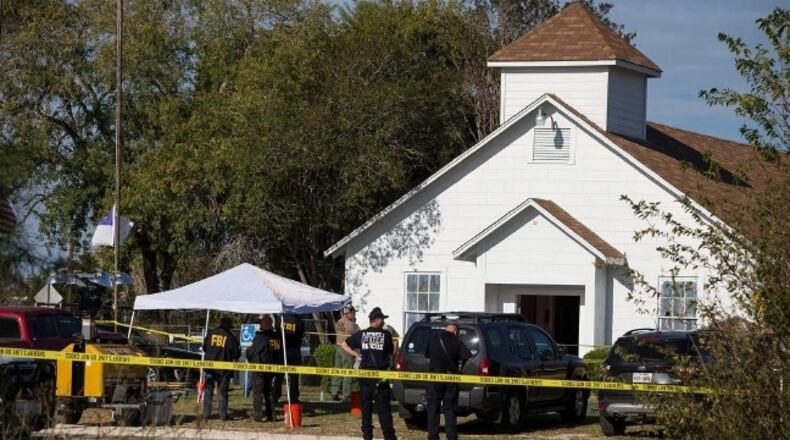"This isn't a guns situation," President Trump tells us after the horrific slaughter in a rural Texas church on Sunday. "This is a mental health problem at the highest level."
In one sense, that's true. This long, depressing string of random mass shootings should force us to acknowledge that for some, there is a cold romance in evil, in evil so unthinkable and outrageous that a dangerous few among us will be drawn to commit it, should the means be available. It also seems probable that these men recognize something in each other, that they share an anger and alienation that has now found an outlet that appeals to them, and that like a disease is likely to spread.
Walking into a quiet country church during worship hour, dressed in black tactical gear and armed with an assault weapon, and mowing down parishioners as young as 18 months. Walking into church Bible study to kill black people; walking into a Connecticut elementary school to slaughter grade-schoolers; walking into a Vegas hotel and setting up a sniper's nest in the 32nd floor, looking down upon tens of thousands of people knowing far more joy than you could, and killing and wounding more than 500 in a matter of a few minutes ....
Yes, there is undoubtedly a mental-health component to the problem.
However, that framing is also consciously misleading. It implies that if it's a mental-health problem, then there must be a mental health solution. And even a cursory attempt to think through the problem tells us that there is not.¹ The idea that we are somehow going to find and pre-identify these people, that we're going to pick a potential Devin Kelley or Stephen Paddock out of the crowd, that once they're identified we're going to somehow deny them access to weapons of mass destruction in a society that is awash in such tools -- it's pure nonsense. The argument that this is a mental-health problem is an argument for doing nothing, for simply accepting this carnage as a fact of modern life.
Personally, I do not accept that.
If the indiscriminate slaughter of large numbers of people has become a means of expression for those drawn to evil, then a wiser course might be to address the tools that allow them to carry out that fantasy, that partly inspire them to do so. In fact, I firmly believe that the immense, military-grade firepower now available at the pull of a trigger finger is itself part of the intoxication, part of the power that fuels this madness. It creates an excitement and exhilaration among those predisposed to such evil that firearms lethal on a less-grand scale do not.
Those who have studied the history of tools and technology in human society speak of something called the "technological imperative." Basically, the imperative argues that if a tool gives human beings the power to do something, somebody will do it. We will drive and we will text while driving, even if it's not smart, because we can. We will rearrange our own genetic code, because we can; we will blow each other up with nuclear weapons, because we can. And if the power to kill large numbers of people in a short amount of time is placed in enough hands, then inevitably, that power will be used.
In most of those cases, and in many others as well, we have learned to erect legal, practical and ethical barricades to the abuse of machines and tools, to contain the technological imperative. It is madness to then suggest that there must be one form of machine, one technology, that is exempt from such regulation, especially when the primary function of that particular machine is to kill our fellow man.
Why choose that form of technology to be exalted, to be placed above all others? That is not what the Second Amendment requires of us, not as it was designed by the Founders and not as the courts have interpreted it. These high-capacity assault weapons are not constitutionally protected weapons of self-defense, and they aren't being used for that purpose, yet we do nothing.
So in that sense, too, I guess our failure to recognize and act upon this is "a mental health problem at the highest level."
-----------------------
¹ The very people who attempt to frame it as a mental-health issue are attempting to defund what little mental-health treatment is publicly available, and to frustrate attempts to keep firearms out of the hands of the mentally incompetent. Under a regulation that took effect in December, for example, those people determined by the Social Security Administration to be too mentally disabled to work, and who require a representative to handle their Social Security benefits, were deemed ineligible to buy firearms. The NRA objected, even though the regulation also gave those people the right to go to court to prove their mental competence to buy firearms.
In February, Congress did the NRA's bidding by voting to overturn that regulation, once again allowing hundreds of thousands of people too incompetent to run their own affairs to go out and buy firearms. In the House, only two Republicans voted to retain the rule. In the Senate, none did. On Feb. 28, Trump signed the bill into law.
Fugitives from the law are also barred from buying guns legally, but in February the Trump administration weakened that protection as well, over the protests of the FBI. Under the new interpretation, that ban on gun purchase applies only to those fugitives who have fled across state lines; if you are a fugitive from a criminal charge trying to buy a gun legally in the state that is seeking your arrest, you are now allowed to do so.
About the Author
The Latest
Featured



